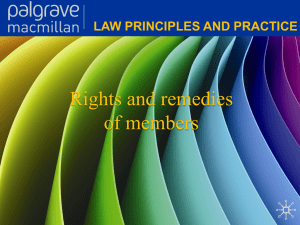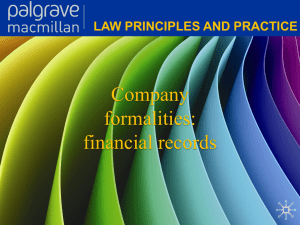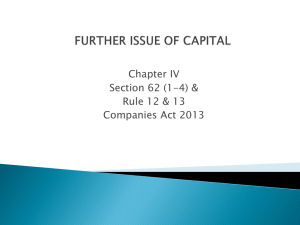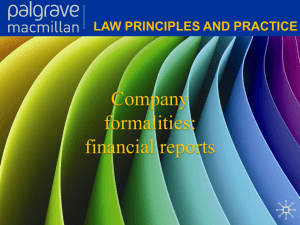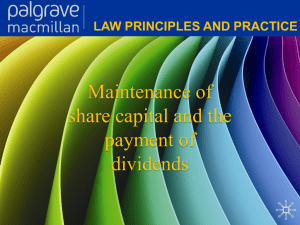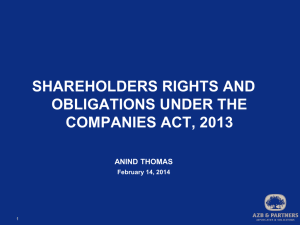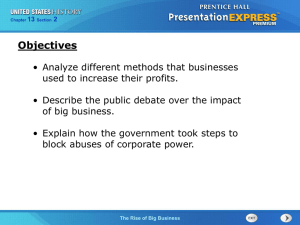Chapter 3
advertisement
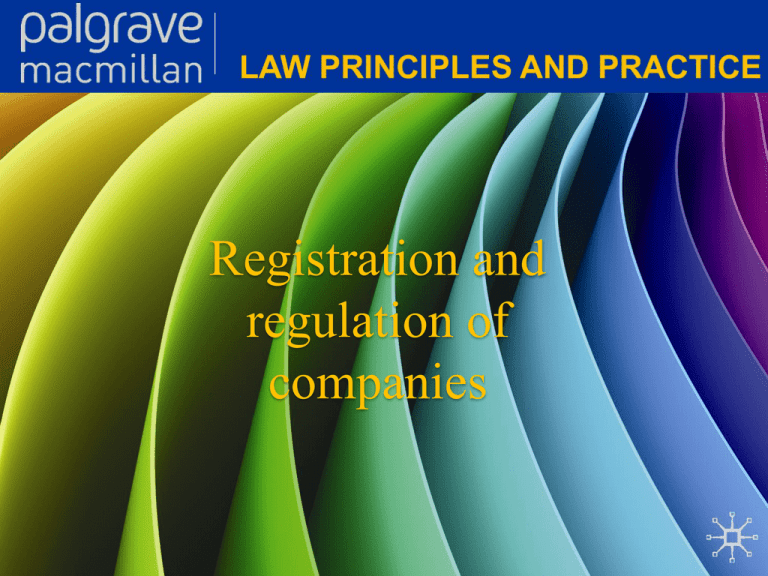
Registration and regulation of companies Corporate Law: Law principles and practice Registration of a company (incorporation) Historically, a company could be created by royalty or, later, by an Act of Parliament. Companies are now created by being registered with ASIC. A promoter can buy a ‘shelf company’, or can complete the registration process themselves. Corporate Law: Law principles and practice Registration of a company (incorporation) cont … A partnership business that reaches 20 members is required to register as a company (Corporations Act 2001 (Cth) s 115(2)), unless it falls within one of the exemptions. Foreign companies (those registered outside Australia) must register with ASIC (s 601DA) if they wish to carry on business in Australia. Corporate Law: Law principles and practice Registering a company Pre-registration requirements An application must be lodged with ASIC. A company may choose not to apply for name. The application for registration must contain the following (Corporations Act 2001 (Cth) s 117(2)): • • • the type of company that is proposed the company’s proposed name, unless the ACN is to be used in its name the name and address of each person who consents to become a member Corporate Law: Law principles and practice Registering a company cont … • • • • • • the name and birthdate of those consenting in writing to become directors the name and birthdate of those consenting to become the company secretary the address of each person who consents in writing to become a director or company secretary the address of the company’s proposed registered office the proposed opening hours of the registered office (if not the standard opening hours) for a public company the address of the company’s principal place of business (if not the address of the proposed registered office) Corporate Law: Law principles and practice Registering a company cont … • • • for a company limited by shares or an unlimited company, the number and class of shares, and the amount agreed to be paid for each share (in writing), and if not fully paid, the amount agreed to be unpaid (in writing) on each share for a public company limited by shares, or an unlimited company, the details of an issue of shares for other than money for a company limited by guarantee, the proposed amount of the guarantee (in writing) by each member. Corporate Law: Law principles and practice Registering a company cont … An application may require a company constitution (e.g. a no-liability company that must restrict its activities to mining). ASIC (if satisfied) will register the company and issue it with a certificate. The certificate records the company’s name, ACN, type of company, a statement that it is registered and the date of registration. A company comes into existence on receiving that certificate (Corporations Act 2001 (Cth) s 119). Corporate Law: Law principles and practice Post-registration procedures Once a company is registered, it must: • • • • • update ASIC on any changes that have taken place (for example, change of address or directors) display some notice as to the address of the company the persons consenting to become a member, director or company secretary on the application take on their role (Corporations Act 2001 (Cth) s 120(1)); if not, the company secretary must be appointed (s 204D) choose to have a seal and, if it does, the seal must contain the ACN and the company name (s 123(1)) establish financial records (s 286) and minute books to record meeting resolutions (s 251A) Corporate Law: Law principles and practice Post-registration procedures cont… • • • • • appoint an auditor (if a public company or large proprietary company) (s 327A) appoint a public officer for tax purposes (s 252) establish registers of shareholders, charges and debentures (s 168) issue shares, if relevant (s 1096) hold an annual general meeting if a public company (s 250N). Corporate Law: Law principles and practice Post-registration procedures cont… A company will be considered to be active unless deregistered by ASIC Corporations Act 2001 (Cth) (s 601AD(1)). A company must disclose in its annual review any changes that take place within the company and pay an annual fee. A company must display its name and company type (in an abbreviated form) according to statutory provisions: ss 148, 149. Corporate Law: Law principles and practice Advantages and disadvantages of the company form • • • • • The separate entity of a company gives general protection to officers, employees and members (with some exceptions). Members have limited liability according to the amount of shares paid up (unless an unlimited company). It has a continual existence, even though its members and management may change. Ownership in the company can easily be transferred by the selling of shares. Shareholders can control and elect the management of a company according to their holding of shares. Corporate Law: Law principles and practice Advantages and disadvantages cont … • • • • • • A company can make contracts with its shareholders since they are separate entities. There are no limits on the number of shareholders, unless the company is a proprietary company. There may be certain tax advantages, as a company pays a low fixed-percentage tax and franking of dividends is possible. A company can readily raise capital for large undertakings. A company can own property in its own right, and sue and be sued through its own personal entity. A company can be wound up according to a statutory procedure. Corporate Law: Law principles and practice Disadvantages • • • • • The corporate form is much more regulated and, consequently, more expensive to establish and run because of the Corporations Act 2001 (Cth). The Corporations Act 2001 (Cth) and existing case law impose far greater duties and hence penalties on officers and directors of the company, including criminal sanctions. There tends to be less privacy in the company form since financial reports must be disclosed to ASIC and to members. The company is a more rigid business form and it may be more difficult to change the company constitution or its format. Where a corporate form is used and many shares are issued, it is possible for the original owner to lose control of the organisation they founded. Corporate Law: Law principles and practice Registering a company Types of companies that can be registered Types of companies (s 112) Proprietary companies Limited by shares Unlimited with share capital Public companies Limited by shares Limited by guarantee Unlimited with share capital No-liability company Corporate Law: Law principles and practice Registering a company cont … Legal requirements The Corporations Act 2001 (Cth) applies to corporations. Some non-corporate bodies will be subject to the Corporations Act if they trade interstate. Trade Unions and some specific bodies are not covered by the Corporations Act. Corporate Law: Law principles and practice Public companies A company that is not registered as a proprietary company is deemed to be a public company. A public company is the most regulated form of company. A public company can be listed on the ASX, can offer its securities to the public and has no limits on the number of members it can have. A public company can be limited or unlimited by shares, and only public companies can be no-liability or guarantee companies. A public company can form with just one member (Corporations Act 2001 (Cth) s 114) but must have a minimum of three directors (s 201A(2)), so it cannot be a one-person company. Corporate Law: Law principles and practice Public companies cont… Some main features of a public company are: • • • • • it has no restriction on its ability to raise capital from the public through issuing shares or borrowing it must have a company secretary (Corporations Act 2001 (Cth) s 204A) it must hold an annual general meeting (s 250N) it must appropriately prepare, and lodge with ASIC, an annual financial report (s 292), including details about directors (s 300(10)) there are certain restrictions on related transactions with the company (for example, receiving loans by directors is quite regulated). Corporate Law: Law principles and practice Proprietary companies Proprietary companies are sometimes referred to as private companies, and tend to be smaller than public companies. The main characteristics of a proprietary company are: • • • • • it can form with one person it must have share capital and can be limited or unlimited it is limited to not more than 50 non-employee shareholders (Corporations Act 2001 (Cth) s 113(1)), although membership can exceed 50 when other members are employee shareholders it does not have to hold an annual general meeting (ss 250N, 250P) it must not engage in any activity that would require disclosure when offering securities Corporate Law: Law principles and practice Proprietary companies cont … • • • • • • • it can pass ordinary resolutions without the need for general meetings by using a circulating resolution (s 249A); special resolutions must be passed by a general meeting (s 249L) a quorum for a meeting need only be two persons (s 249T) loans can be made to directors a proprietary company can restrict the transfer of its shares there is no restriction on the age of directors after the age of 72 (s 288) it can appoint an auditor or liquidator from its own officers or employees (s 324(1)(f), (2)(g)−(h), 532) it is less regulated than a public company. Corporate Law: Law principles and practice Small and large proprietary companies A company can be classified as a small proprietary company if in a financial year it can satisfy any two of the following conditions (Corporations Act 2001 (Cth) s 45A(2)): • • • a gross operating revenue of less than $25 million consolidated gross assets of less than $12.5 million fewer than 50 employees. If a proprietary company is not a small proprietary company, then it is a large proprietary company (s 45A(3)). Small proprietary companies do not have to lodge annual financial reports (s 304) or have them audited (s 301), unless required to so by ASIC (s 292) or a member. Large proprietary companies do have to lodge annual financial reports, which makes them more expensive to run. Corporate Law: Law principles and practice Company limited by shares The majority of Australian companies are limited by shares (Corporations Act 2001 (Cth) s 112(1)). Members of a company are shareholders and have limited liability up to the paid-up amount of the share (s 516). A member is liable for any amount that is unpaid on a share. Corporate Law: Law principles and practice One-person companies The Corporate Law Economic Reform Program (CLERP) has allowed companies to form with one person since Statewide Tobacco Services Ltd v Morley [1993] 1 VR 423. Corporate Law: Law principles and practice One-person companies cont … A company can now form with one member, who is both the shareholder and director. The replaceable rules, with some exceptions (see Corporations Act 2001 (Cth) s 135(1)), do not apply to one-person companies that do not have meetings or vote. Some provisions apply (see next slide). Corporate Law: Law principles and practice One-person companies cont … Some provisions: • • • • • A director can manage all business of the company (Corporations Act 2001 (Cth) s 198E). A director can appoint another director in writing (s 201F). A single director can make a resolution as to their own remuneration and payment of their expenses on behalf of the company (s 202C). By placing a resolution in writing, a director can pass resolutions, or deem them as passed, without conducting a meeting (s 249B). Outsiders dealing with the company can rely on ss 128 and 129. Corporate Law: Law principles and practice Holding companies A holding company is a company that owns or controls another company, which is referred to as a subsidiary of the parent company. A company is classified as a subsidiary according to s 46(a) and s 9 of the Corporations Act 2001 (Cth) if another body: • controls the board of directors • controls the majority of votes • holds more than half of the issued shares of the subsidiary. A holding company must prepare group financial reports so that assets or money cannot be hidden. A subsidiary cannot own shares in its holding company. Corporate Law: Law principles and practice Trustee companies A number of companies are able to register as statutory company trustees under state legislation, and can offer particular services to the public related to trust-type activities. Corporate Law: Law principles and practice Guarantee companies A guarantee company is a public company in which the members of the company do not limit their liability by the holding of shares, but rather sign an agreement that they will guarantee a certain amount in the event that the company is wound up (Corporations Act 2001 (Cth) s 517) Note there are some old hybrid guarantee companies which have shares (no new company is permitted to do this). Guarantee companies are used for not-for-profit purposes and may remove Ltd from their name if satisfying certain conditions. Corporate Law: Law principles and practice Unlimited companies A company can register as an unlimited company, which means that the members take unlimited liability on behalf of the company. There are vey few unlimited companies in Australia. They may be used by assurance companies to indicate good faith. Corporate Law: Law principles and practice No-liability companies A no-liability company is a public company that is registered as a mining company under the Mining Act, has share capital and states in its constitution that its business activities are confined to mining s 112(2)–(3) of the Corporations Act 2001. These are speculative high-risk types of companies. If it issues partly paid shares, it cannot force a member to pay the remainder on calls on those shares (s 112(2)(c) and s 254M(1)–(2)), though they may then be confiscated. A no-liability company is designated by the abbreviation NL after its name (s 148(4)). Corporate Law: Law principles and practice Changing the status of a company A proprietary company can convert to a public company limited by shares or to an unlimited company—either public or private—but not to a guarantee company or a no-liability company. There are some restrictions on converting to certain formats (Corporations Act 2001 s 162): • • • A proprietary company that seeks to convert to a public company must pass a special resolution, lodge an application with ASIC, and remove the word ‘proprietary’ from its name. If a company contravenes its status as a proprietary company then ASIC may order the proprietary company to change its status (s 165). A public company must follow a similar procedure to that of a proprietary company and will still be liable for their original debts and obligations.
